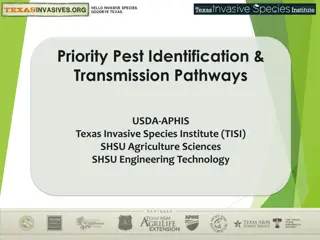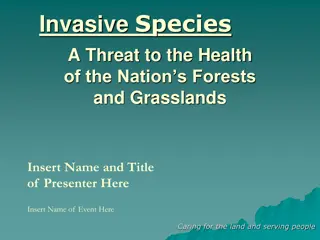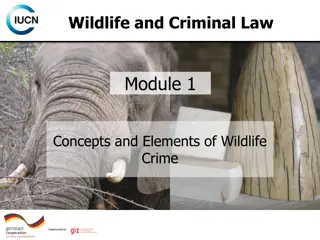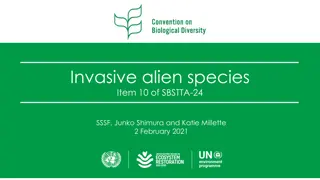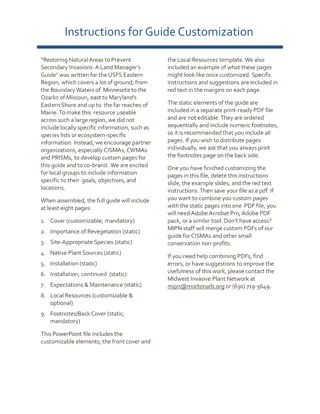Invasive Plants Wanted for Crimes Against Southampton Wildlife
In Southampton, invasive plant species like Black Swallow-wort, Barberry, Japanese Knotweed, Oriental Bittersweet, and Multiflora Rose pose threats to local wildlife and landscapes. These plants spread rapidly, impacting natural habitats and ecosystems. To combat this, manual removal methods and careful disposal are recommended to control their growth effectively. Conservation efforts are vital to protect the environment and native species from the harmful effects of these invaders.
Uploaded on Oct 05, 2024 | 0 Views
Download Presentation

Please find below an Image/Link to download the presentation.
The content on the website is provided AS IS for your information and personal use only. It may not be sold, licensed, or shared on other websites without obtaining consent from the author.If you encounter any issues during the download, it is possible that the publisher has removed the file from their server.
You are allowed to download the files provided on this website for personal or commercial use, subject to the condition that they are used lawfully. All files are the property of their respective owners.
The content on the website is provided AS IS for your information and personal use only. It may not be sold, licensed, or shared on other websites without obtaining consent from the author.
E N D
Presentation Transcript
WANTED For crimes against Southampton wildlife and landscapes: Swallow-wort The Problem Black Swallow-wort (purple flowers) and Pale Swallow-wort (pinkish flowers) invade fields, field edges, and woodlands. Close relatives of milkweed, these species may interfere with monarch butterfly reproduction. The Solution Hand-pull seedlings and young plants and dig up mature plants. Pods should be bagged and thrown away. Follow-up control of seedlings will likely be needed in subsequent years. www.massaudubon.org/learn/nature-wildlife/invasive-plants
WANTED For crimes against Southampton wildlife and landscapes: Barberry The Problem Common Barberry, with three-part thorns and Japanese Barberry with its thorny twigs, both have attractive red berries in the summer and fall. Birds eat the berries and then disperse the seeds broadly where the plant can take over fields, forests, and wetlands. The Solution Remove the plants by hand. Wear gloves to protect yourself from the thorns. The use of pesticides is prohibited in wetlands without a special license. www.massaudubon.org/learn/nature-wildlife/invasive-plants
WANTED For crimes against Southampton wildlife and landscapes: Knotweed The Problem Japanese Knotweed has heart-shaped leaves and thick hollow stems. It can grow 10 feet tall in thick clumps that crowd out all other plants. The Solution Pull young plants by hand before they are established. Mature plants should be cut down or pulled in June or July. The use of pesticides is prohibited in wetlands without a special license. www.massaudubon.org/learn/nature-wildlife/invasive-plants
WANTED For crimes against Southampton wildlife and landscapes: Bittersweet The Problem Oriental Bittersweet, a think woody vine with red berries covered in a yellow shell in the fall, can grow to be 60 ft long. It wraps around tress and smothers surrounding vegetation. The Solution Pull young plants by hand before they are established. A 4-foot section of the climbing vine can be cut from the ground level to kill the plant in tall trees. Leave the remaining plant to decay because pulling it could damage the tree. www.massaudubon.org/learn/nature-wildlife/invasive-plants
WANTED For crimes against Southampton wildlife and landscapes: Multiflora Rose The Problem Multiflora Rose is a shrub with white flowers, red fruits, and sharp thorns. It grows in dense stands, taking over field edges, forest openings, and wetlands. The Solution Mow or hand prune 3-6 times a year for several years in a row. Wear gloves to protect yourself from the thorns. The use of pesticides is prohibited in wetlands without a special license. www.massaudubon.org/learn/nature-wildlife/invasive-plants
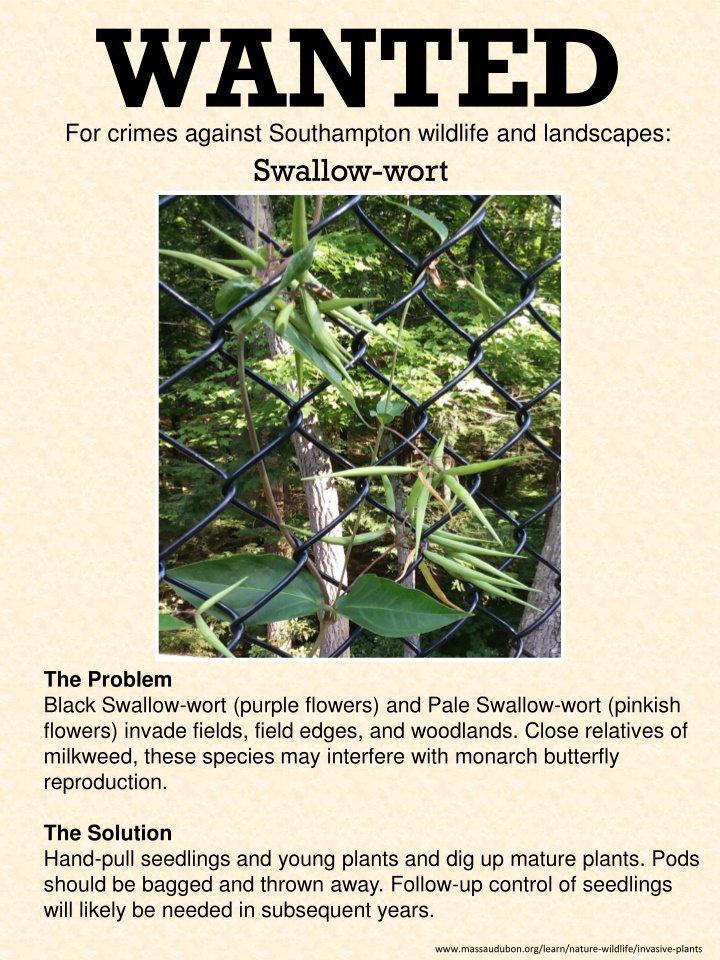

![Prevention and Combating of Hate Crimes and Hate Speech Bill [B.9B.2018]](/thumb/60513/prevention-and-combating-of-hate-crimes-and-hate-speech-bill-b-9b-2018.jpg)
